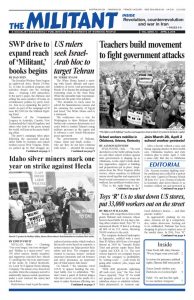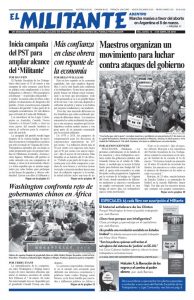“This was the first time a group of Israeli settlers ever came to talk with us,” Eid Abu-Khamis, a leader of Bedouins fighting eviction from the West Bank village of Khan al-Ahmar, told the Militant by phone March 12. Some residents of the Kfar Adumim settlement, just a mile away, had decided to meet their Bedouin neighbors last year after learning the Israeli government wanted to demolish their village school. The school was built there in 2009.
After seeing the school, a dozen Kfar Adumim residents added their names to a petition to Israel’s Supreme Court. “They wrote to their government. ‘Don’t demolish. These are our neighbors,’” Abu-Khamis said. This shows that Israeli settlers aren’t monolithic in their views.
Israeli authorities have been trying for years to evict the 35 Bedouin families from the Jahalin clan who live in Khan al-Ahmar, northeast of Jerusalem. The Israeli government wants to use the land to expand the settlement.
Many Bedouin — traditionally nomadic herders raising goats and camels — were expelled from the Negev Desert in southern Israel between 1948 and 1951, including the Jahalin clan. They moved north and leased land from an Arab landowner in the then-Jordanian-ruled West Bank. Then Israeli authorities took control of all of the West Bank after the 1967 Six Day War.
The Israeli state started confiscating Arab land, including the area around Khan al-Ahmar. Israeli soldiers would demolish some of the Bedouin’s tent-like homes in Khan al-Ahmar every few years, saying they were built without permits.
The Israeli settlement of Kfar Adumim was begun in 1979, one of many similar settlements, part of the Israeli government’s strategy of extending its control throughout occupied Palestinian territory on the West Bank. Today more than 2,500 people live in the settlement, a mixture of religiously motivated ideological supporters of Israeli expansion and more secular Jews drawn to the area because of its cheap housing and proximity to jobs in Jerusalem.
“Why are my community’s homes, which were built a very long time ago, illegal, while the settlement nearby, which was built just a couple of decades ago, is legal?” Abu-Khamis told the Jerusalem Post.
Some Bedouin work at Kfar Adumim as gardeners, electricians and in building maintenance, earning wages much higher than they can get in areas under Palestinian control. After Khamis became well-known for his activity opposing the evictions, his permit to enter the settlement was cancelled. He had worked in construction there for 15 years.
Settlers oppose the forced moves
The visit to the Bedouin school was organized by Dan Turner, who has lived in Kfar Adumim for 20 years. Turner is a physician and director of the Shaare Zedek Institute of Pediatric Gastroenterology and Nutrition in nearby Jerusalem.
“When I heard for the first time that the school was going to be demolished ‘on my behalf,’ I put on Facebook that I was going to go see them,” Turner said by phone March 13. “I was sure I was going alone, but over the course of several visits more than 70 people joined in, and we had serious discussions with the Bedouin.”
“I’m part of a small minority and many of my friends tell me I’m making a huge mistake,” Turner said. “But that’s the beauty of Israel, that you can say what you like. You’re free to agree or disagree.”
Turner knew Abu-Khamis, because he helped build Turner’s home, but had never visited Khan al-Ahmar. He was impressed by the elementary school, which is built out of old tires and mud mixed with falafel oil. Some 170 children from surrounding Bedouin communities attend classes there.
“It doesn’t matter if you are Jewish, Muslim or Christian. Everyone should be treated the same. The Bedouin have been there for almost 50 years. They have the right to the land,” Turner said. “The school is wonderful. And to imagine that it is going to be demolished and people forced to move 15 kilometers away [9.3 miles] — it’s not a good solution.”
“Personally, I would be happy that they stay there and more than happy to have them teach us Arabic,” he said, “and we can teach them English or Hebrew. That would be beautiful.”
The Supreme Court has ruled against the demolitions and evictions several times, Shlomo Lecker, a lawyer who represents the Jahalin clan and other Bedouin communities fighting evictions across the West Bank, told the Militant. The court said that the Bedouin couldn’t be evicted unless the state agreed to relocate them. But none of the alternate locations are acceptable to the Bedouin.
The Israeli government’s goal “is to take over as much of the area from Jerusalem to Jericho to the Dead Sea as they can,” Lecker said.
If the government succeeds, this would essentially split the West Bank in half, undermining the Palestinians’ just fight for a sovereign, contiguous state of their own.
Several petitions to the Supreme Court to block the demolitions have been consolidated and will be heard April 25, Lecker said. “I hope the court will make a decision that encourages the state to negotiate with the Bedouin.”

